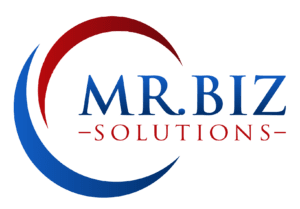
Ken Wentworth, aka Mr. Biz, is a strategic business partner who helps business owners run their companies more profitable and more efficiently. After ascending to the top 3% at JP Morgan, a Fortune 15 company, and breaking six world records, Mr. Biz uses his experience and expertise to help others develop their skills to become more successful business owners.
Mr. Biz wrote two bestselling books. His most recent, Pathway to Profits, providing an actionable blueprint to excelling in any economy. Ken has also hosted “Mr. Biz Radio” for the past four years, which airs 40 hours each week across five different networks. Mr. Biz now has over 260K followers on his social media channels and has been featured on Forbes, Yahoo Finance, Fast Company, The New York Finance, and American Express.
We are excited to welcome Mr. Biz as Porter Capital’s latest Strategic Partner. We spent some time talking to Ken about his career and knowledge in the financial industry.
How did you get started in the financial services industry?
“I started at JP Morgan, which was Bank One at the time, right after finishing my undergrad studies at Capital University in Columbus, Ohio.
My undergrad is in accounting, so I started there in the accounting department. I left accounting after a couple of years and went into the finance world. I was then in the operations world for a while and did a lot of different things. I was CFO for a lot of different businesses under the JP Morgan umbrella.
I was in the planning and analysis role my last 8 or 10 years and made it to the top 3%. Ironically enough, I was being promoted to the top 1% within JP Morgan when I decided to leave.”
What led you to start Mr. Biz Solutions/Wentworth Financial Partners?
“I had to develop two different revenue-generating ideas at JP Morgan within about a 3-4 month period. Both had been shelved for the typical big company bureaucracy red tape stuff, and it was frustrating. I had always had an entrepreneurial spirit, entrepreneurial mind, and wanted to have my own company and business. The second idea being shut down was just a sign for me.
During an elevator ride from the 48th floor in 270 Park Avenue in Midtown Manhattan to the first floor, I decided I was ready to leave and wasn’t even sure what I was going to do next. So, I had a conversation with a mentor about what I wanted to be when I grew up. I didn’t even know what I do today was a thing because I was involved in the corporate world my entire career. Once he explained what a fractional CFO or part-time CDO was, it made a lot of sense. And that’s how Wentworth Financial Partners got started. Wentworth Financial is my one on one clients that I work with. I help them run their businesses more profitably and efficiently.
From there, I was having a lot of business owners come to me in need of help, but they didn’t necessarily have the revenue to support hiring a part-time CFO. I began brainstorming with my advisory board to see how I could scale my time and help those businesses. That’s when we came up with Mr. Biz Solutions, a continuity membership model that is affordable for businesses. It gives them access to not only me as a CFO but five other resources as well. It provides a one-stop-shop of support for a lot of different areas they need help in. Everyone in Mr. Biz Solutions has 20 plus years of experience in their field. So getting access to people who are absolute guru experts in their area was what we built.”
Tell us more about Mr. Biz Radio. How did you get started with it? What topics do you cover?
“Mr. Biz Radio got started after I was asked to be a guest on another show as a quote-unquote expert guest. There was me, an attorney, and a marketing person, and we were taking calls from business owners. Depending on what the question was and whose area of expertise it landed, we would answer.
After the second show, the station’s general manager came to me and said they had been looking for someone to start a business talk radio show. I was very hesitant, but finally, they talked me into it, and I agreed to do eight shows. After about five or six shows, I thought it was pretty cool, and I continued to do it. That was over four years ago. Now we are on five different networks, and the show airs 40 hours a week.”
Do you have any other exciting projects in the works?
“We are in the process of launching an online course, so again just continuing to evolve the business and being able to reach people in whatever capacity works best for them. We went from Wentworth Financial Partners to Mr. Biz solutions, which is the virtual continuity program. Now we are expanding into an online course named after my book, Pathway to Profits.”
How important is cash flow for startups and small businesses?
“I say all the time that cash flow is king. That’s how I close out every episode of Mr. Biz Radio; without cash, you don’t have a business, so it can’t get more important than that. That’s why I wrote my first book, How to Be a Cash Flow Pro. I did not even intend for it to be a book. It started as a common thread with clients I was helping. It often came down to the cash flow problems, so I began to write those down to have a resource to give my clients when I’m not around. It continued to grow until it became a book. Cash flow is the most important thing, it’s one of my three pillars for financial success for businesses, and cash flow is the first thing because you have to have cash flow.”
How has the pandemic affected businesses, and what are some practical solutions you have seen?
“I think the easy answer is to be prepared for an economic downturn. Of course, no one expected a pandemic with the global ramifications it has had. I was expecting an economic downturn, not a pandemic, but I prepared all my clients for a downturn to start in July 2020. In 2019, we began focusing on this, so I looked like a genius when everything went south in 2020 with the pandemic.
Again, I had no idea the pandemic was coming, but we were prepping for just the normal business cycle. We had ten years of unprecedented growth in the business world. I wasn’t trying to be negative, but we were headed for a downturn given the normal business cycle. Being prepared ahead of time is critically important.
You need to be prepared ahead of time. Some effective solutions are adapting and having a strategic mind and vision for what the future holds. I consider myself to be a strategic business partner with each of my clients. As a business owner, you are running around, putting out fires left and right. One of the things I’m able to do when working with business owners is helping them put on that strategic hat and think six, twelve, thirty-six months out and making sure that those goals and decisions are congruent. Essentially making sure we’re prepared for all the inevitable bumps in the road we’re going to face during that five-year run.”
When do you find your clients need working capital? When does working capital make sense?
“Working capital, especially with invoicing, depends on the industry. I work with some IT companies that do long-term projects, and they might only bill at milestones. They are paying their development staff all the while. Having AR factoring is critical if they don’t have the capital on their balance sheet to continue funding their development staff.
I look at challenging times as opportunities. If you are positioned well, or you have working capital, you can seize those opportunities. I had multiple clients seize opportunities during the pandemic because, unfortunately, some of their competitors were not positioned financially and did not make it through the pandemic. The new client base from their competitors needed servicing and created explosive growth for my clients. Had they not had the working capital on the balance sheet, they would have needed that capital to fund purchasing new trucks or hiring new resources to handle that increased volume.
As long as you have the wherewithal financially, looking for opportunities when there are downtimes is the best time to do it because it’s typically less expensive. Capital costs are less, and interest rates are usually low when there’s an economic downturn. I think those are some important things to consider with working capital and when it use it.”
How can Porter Capital help companies hyper-scale?
“As I just mentioned; utilizing that capital and having working capital at your disposal when you need it. Again, some of those times when you need it is when the market is down, and overall business is down. A lot of people are looking to contract during those times. I have the exact opposite contrarian approach to that. That’s the time to look for expansion and push forward. Think about the impact of expanding during that time, and then the economy turns back and heads north again. You are positioned for an absolute slingshot, catapulting your business forward and well beyond where it was going into that downturn.”




